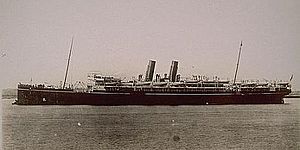RMS Moldavia facts for kids

RMS Moldavia
|
|
Quick facts for kids History |
|
|---|---|
| United Kingdom | |
| Name | RMS Moldavia |
| Owner | P&O Steam Navigation Co |
| Port of registry | |
| Builder | Caird & Company, Greenock, Scotland |
| Yard number | 301 |
| Launched | 28 March 1903 |
| Fate | Bought by the Admiralty in 1915 and converted into an armed merchant cruiser. |
| United Kingdom | |
| Name | HMS Moldavia |
| Port of registry | |
| Acquired | 1915 |
| Fate | Torpedoed and sunk 23 May 1918 |
| General characteristics | |
| Class and type | P&O M-class passenger liner |
| Tonnage | 9,500 tons |
| Length | 520 ft (160 m) |
| Beam | 58.3 ft (17.8 m) |
| Draught | 24.8 ft (7.6 m) |
| Installed power | 2 triple expansion steam engines |
| Speed | 18.5 knots (34.3 km/h) |
| Capacity |
|
The RMS Moldavia was a large British passenger ship from the early 1900s. She was built to carry people across the oceans. During World War I, she became a warship for the Royal Navy, known as HMS Moldavia. Sadly, a German submarine sank her in 1918.
Contents
Building a Giant Ship
How Moldavia Was Made
The Moldavia was built by a company called Caird & Company. They were located in Greenock, Scotland. Her construction started in 1903. She was officially launched into the water on March 28, 1903.
Ship's Size and Features
The completed ship was very long, measuring 520 ft (160 m). That's longer than a football field! She was also 58.3 ft (17.8 m) wide. The ship weighed 9,500 tons. She could carry about 2,000 tons of coal for her engines. She also had space for about 3,500 tons of cargo.
The Moldavia was designed to carry many passengers. She had room for 348 first-class passengers. Another 166 passengers could travel in saloon class.
Moldavia's Journey and War Service
Life as a Passenger Ship
The Moldavia was owned by the Peninsular and Oriental Steam Navigation Company, often called P&O. She regularly sailed a long route from England to Australia. This journey took her through the famous Suez Canal.
In 1915, during World War I, the British Admiralty bought the Moldavia. They needed more ships for the war effort. She was changed into an armed merchant cruiser. This meant she was a merchant ship, but she was given powerful 6-inch guns. After these changes, she became known as HMS Moldavia.
Patrolling the Seas
As a warship, the Moldavia joined the 10th Cruiser Squadron. She served on the Northern Patrol. Her job was to stop and check merchant ships in the North Atlantic Ocean. This helped to make sure no enemy supplies were getting through.
Final Voyage and Sinking
Later in the war, the Moldavia was used as a troopship. She was carrying soldiers from the United States. On May 23, 1918, she was sailing near Beachy Head in the English Channel. A German submarine, called SM UB-57, fired a single torpedo at her.
The torpedo hit the Moldavia, and she began to sink. Sadly, 54 U.S. soldiers on board lost their lives during the sinking. One more soldier passed away two days later in a hospital.
A Protected Wreck
Today, the wreck of the Moldavia is protected. In 2017, it was added to the Protection of Military Remains Act 1986. This means the site is a designated vessel. It is treated with respect as a war grave.
 | Stephanie Wilson |
 | Charles Bolden |
 | Ronald McNair |
 | Frederick D. Gregory |

